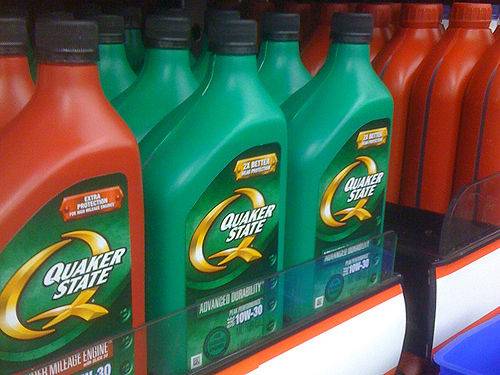Shell Talks Gas Mileage and Latest Motor Oils


Hsu, a technology manager based at the Dutch company’s U.S. headquarters in Houston, works on Shell’s motor oil brands, which include Quaker State and Pennzoil. I caught up with him recently at a briefing for journalists in the Chicago suburbs.
With federal Corporate Average Fuel Economy standards pushing cars and trucks toward higher standards by the 2016 model year, Hsu said he’s never seen automakers come to the table looking for motor-oil providers to help raise fuel economy quite like they’re doing today.
“They look to us to develop lubricants to help fuel economy,” Hsu said. “Any fluid that will give them an advantage to get two-tenths [of a percent] of a savings or one-tenth of a savings … it’s significant.”
It’s a challenge on many levels. Engines are getting smaller and more high-tech, and the technology — from turbochargers to direct-injection — means more heat. Motor oil lubricates most of the moving parts in an engine, and it needs to be able to withstand that heat. What’s more, a lot of carmakers want all of this to happen while using less oil, Hsu said.
Consumers may benefit from higher gas mileage. Last month, the EPA noted that the auto industry averaged 22.5 mpg for 2010, marking the sixth year-over-year increase. But those improvements don’t come cheap. GM requires a new GF-5-certified specification it calls Dexos, which AOL Autos reports could add 25 to 30 percent to the cost of your typical oil change. Carmakers like BMW, meanwhile, recommend pricier synthetic oil.
That can be expensive. I stopped at a local Pep Boys after lunch, and a quart of synthetic Pennzoil Platinum 5W-20 retailed for $6.99, compared with $3.29 for a quart of Pep Boys’ in-house ProLine mineral oil. I was driving a Ford Flex, which takes 5.5 quarts of oil. Getting Pennzoil’s synthetic blend versus the cheap stuff for a do-it-yourself job would cost another $20.
“You know how the old saying goes: You pay now or you pay later,” Hsu said. It may cost $50 or more to have a car serviced at a dealership with synthetic oil, but the $20 paid to a local mechanic for mineral-based oil may not hold up to the rigors of a 12,000-mile oil-change interval.
Roughly half of Americans have their cars professionally serviced, Shell says. That’s a marked difference from Europe, where few drivers change their own oil. With automakers like BMW and Toyota now offering free scheduled maintenance for a set period, that could change down the road – eliminating the choice for an increasing portion of drivers between servicing their car at a dealership, the neighborhood grease monkey or their own driveway. In the meantime, all motor oil going forward will have to meet GF-5 standards to be certified by the American Petroleum Institute. So regardless of where you change it, even the cheap stuff will be incrementally better.

Former Assistant Managing Editor-News Kelsey Mays likes quality, reliability, safety and practicality. But he also likes a fair price.
Featured stories




